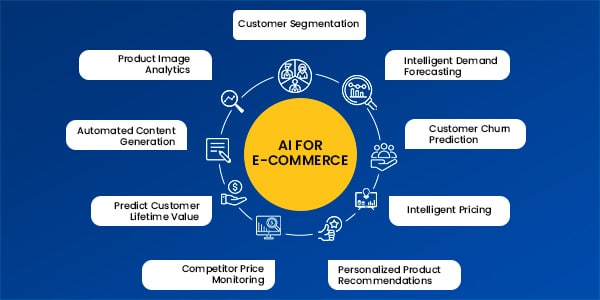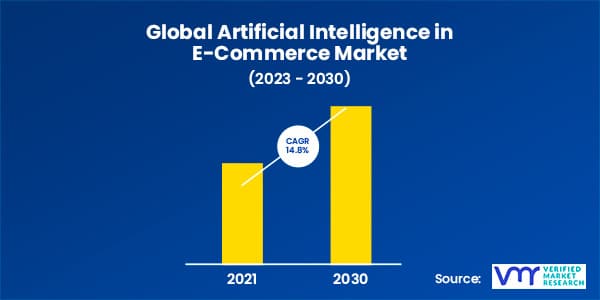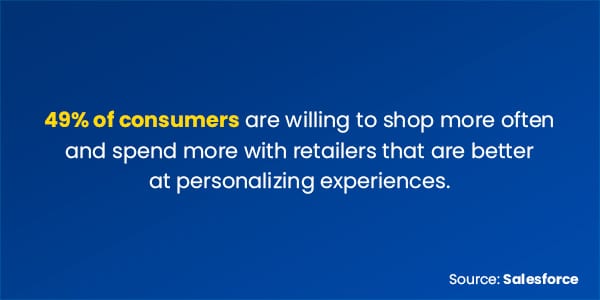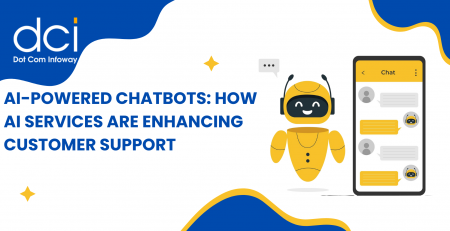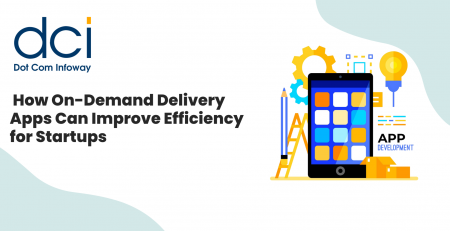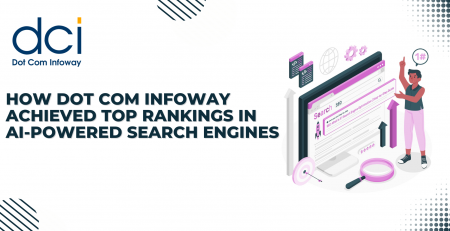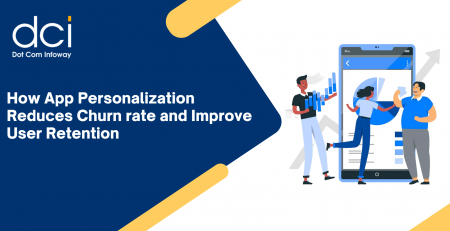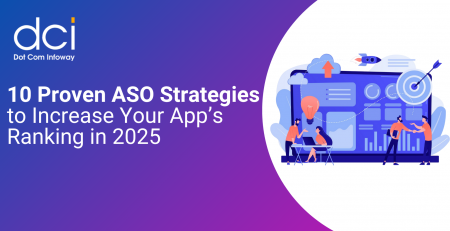Unlocking Your Business Potential with AI in E-Commerce
The transformational impact of AI in ecommerce is accelerating as advanced solutions optimize experiences and operations. With capabilities ranging from personalized product recommendations to intuitive chatbots, AI services are providing and delivering immense value.

This article explores how leading retailers harness emerging technologies to boost key metrics across functions including sales growth through elevated conversion rates, customer lifetime value via tailored loyalty programs, and margin improvements from data-informed cost reductions.
Leveraging AI to Boost eCommerce Performance
With more brands turning to AI to gain an edge in the competitive eCommerce landscape, the growing question becomes – how exactly can AI in eCommerce be utilized to drive business growth?
When effectively implemented and optimized, AI solutions can significantly enhance critical eCommerce performance metrics.
One key way AI supports improved performance is through elevated personalization efforts. As online shopping continues trending toward hyper-personalized customer experiences, AI algorithms leverage vast datasets to understand each shopper and serve tailored product recommendations, promotions, and messaging.
Dynamic remarketing then allows follow-up to nudge customers toward abandoned purchases. When done right, personalization drives higher conversion rates.
For example, some retailers see over 25% of revenue influenced by AI-powered personalized product suggestions.
Harnessing AI to Transform Key eCommerce Operations
Here are a couple of powerful ways that AI in eCommerce is being harnessed by companies as we write this:
Elevating On-Site Search Relevance with AI
Through advances in natural language processing (NLP) and machine learning, AI now interprets search intent with far greater accuracy. This allows matching entered queries to the most relevant products.
Additional techniques like adding synonyms, correcting misspellings automatically, and combining keyword and vector search improve results even further.
Personalized Experiences to Build Loyalty
Hyper-personalized shopping experiences are what consumers expect today. By leveraging AI algorithms to capture and process customer data, ecommerce businesses can understand preferences to offer tailored recommendations and discounts.
Research shows personalization, especially when AI-powered, lifts repeat purchase rates and brand loyalty substantially. The profits of retailers utilizing personalization well exceed those without it by 40% or more.
Spot-On Recommendations to Influence Buying
Leveraging purchase history and browsing data, AI recommendation engines suggest products aligned with customer interests to influence buying. When the algorithm surfaces relevant items at optimal moments, consumers convert at higher rates. Artificial Intelligence takes the guesswork out of recommendations to provide eerily accurate, personalized suggestions.
Intuitive Cross-Sells and Upsells
Based on collaborative filtering and frequently bought-together data, AI applications in ecommerce can determine which additional products shoppers are likely to add at checkout. The technology intuits logical upsells and cross-sells for each customer in real-time to boost order values.
AI-Powered Pricing for Revenue Optimization
With AI price optimization software analyzing competitive and demand data, ecommerce businesses can implement dynamic pricing to maximize both conversion rates and profit margins.
By adjusting price points based on fluctuations in supply and demand, retailers capitalize on opportunities in real time. Studies show effective price optimization driven by AI lifts profits by 4-8% typically.
Conversational AI Support for Better Service
Chatbots now provide 24/7 customer support, leveraging NLP to assess needs and improve suggestions over time via machine learning. By handling common questions and simple requests automatically, chatbots reduce overhead costs while freeing human agents to resolve more complex issues. Their availability and personalization better serves modern buyers.
Inventory Optimization Using Predictive AI
Rather than relying on current stock data, machine learning algorithms make sophisticated predictions to optimize inventory levels. By accurately forecasting demand and minimizing waste, retailers avoid losing sales from stock outs while also cutting overhead costs. AI automation further supports efficient warehouse management.
Safeguarding Transactions with AI Fraud Prevention
Sophisticated machine learning systems analyze millions of data points to instantly identify potentially fraudulent transactions online. This allows retailers to prevent various types of fraud in real-time safely without disrupting legitimate purchases. AI fraud prevention saves ecommerce companies nearly $5 billion annually.
Driving Conversions through AI-Powered Recoveries
With AI capabilities to track browsing data, retailers can determine when users abandon purchases to target them with reminders about items left in their carts. This brings back customers to complete transactions rather than losing them to competitors. Artificial intelligence in ecommerce has been shown to recover 69% more abandoned carts.
Operational Efficiency via Automated Processes
Across all operations from customer support to order fulfillment to accounting, AI automation handles time-intensive administrative tasks to reduce manual labor significantly. With machines tackling mundane work around the clock, human employees can focus their skills on more value-adding initiatives.
Benefits of Using AI in E-Commerce Enterprises
1. Hyper-Personalized Campaigns for Sales Lift
By leveraging AI algorithms to analyze customer data, ecommerce retailers can create customized marketing and advertising messages tailored to individual buyer preferences and histories.
These targeted campaigns focused on one-to-one conversations typically see 10-15% higher response rates and revenue versus broad outreach. AI-powered personalization allows having relevant discussions to influence consumers.
2. Cultivating Loyalty Through Relevance
With machine learning models processing volumes of behavioral data, businesses can understand customers better to serve their needs proactively. Curating individualized product recommendations and promotions nurtures loyalty over time. Studies show omnichannel personalization focused on relevance lifts customer lifetime value by 10-15% on average.
3. Task Automation to Improve Efficiency
AI automation handles high-volume repetitive tasks involved in order processing, customer service, visual merchandising, and more to reduce overhead costs. By minimizing mundane work, solutions allow employees to instead focus on tactical projects that engage their skills better.
The streamlined operations and seamless handoffs facilitated by AI also improve customer satisfaction, which showcases one of the unique effects of AI in ecommerce.
4. Data-Informed Decisions to Mitigate Risk
Leveraging the predictive powers of machine learning, businesses can forecast demand more accurately, optimize pricing strategies, allocate inventory efficiently, and make other data-driven decisions. With AI processing signals from across operations, retailers minimize losses from miscalculations while capitalizing on emerging opportunities faster.
5. Lower Overheads from Optimized Operations
As AI takes over administrative tasks, technology costs are offset by savings from headcount reduction in certain areas as well as process efficiency gains. Solutions pay for themselves over time by minimizing waste and unnecessary labor expenses across functions. The compounding savings from AI automation improves profit margins.
But with the right partner like an AI-focused e-commerce app development agency, implementation can be far smoother. Once operationalized at scale, the technology delivers compounding benefits over time to substantially boost the bottom line.

Supercharge Your Business With AI
We will maximize the potential of your business with our AI services. Contact us today to reap our services at an affordable cost and achieve great heights in the market.
What Are the Ways AI Can Boost Business Results?
1. Customer-Focused Messaging Builds Trust
By delivering personalized and transparent communications, AI chatbots strengthen credibility and relationships. Their ability to comprehend preferences and tailor responses demonstrates a focus on customers.
2. Tailored Experiences Improve Satisfaction
Leveraging purchase data, AI customizes search results, pricing, promotions, and other messaging per individual to efficiently serve relevant offers. One-to-one personalization, in turn, improves satisfaction aiding ecommerce SEO as a whole.
3. Contextual Advertising Drives conversions
Sophisticated algorithms analyze user preferences and demographics to determine optimal targeting strategies across channels. Contextual ad personalization aligned to each customer’s interests converts higher.
4. Conversational Assistants Enhance Service
AI-powered chatbots provide 24/7 customer support, order tracking, and personalized interactions. Their availability and language abilities better assist modern buyers across platforms.
5. Predictive Intelligence Informs Strategy
By evaluating browsing patterns and purchase history data, AI predicts customer needs and ideal offers to influence buying stages. This analysis shapes targeted and persuasive messaging to lift conversions.
6. Encouraging Additional Purchases
Analyzing past transactions, AI in ecommerce identifies complementary products to suggest and incentives provided at checkout to encourage add-ons. The personalized upsell and cross-sell recommendations lift order values.
7. Safeguarding Customer Data
Machine learning algorithms detect anomalies and suspicious activity to identify potential fraud in real time, preventing losses while maintaining seamless transactions. AI cybersecurity enhances provider trust.
8. Omnichannel Personalization
Curating cohesive branding, offers, and experiences across channels, AI strengthens customer relationships by meeting buyers wherever they engage. Omnichannel coordination powered by AI boosts lifetime value.
9. Performance Tracking Guides Growth
By processing customer data to surface actionable insights, AI informs key performance indicators to optimize in areas needing improvement. Detailed tracking and analysis accelerate expansion.
How Are AI Trends Shaping the Future of Ecommerce?
With expanding use cases, it’s safe to say that AI will continue permeating B2C and B2B ecommerce both visibly through enhanced buyer experiences and behind-the-scenes streamlining operations.
Virtual try-on capabilities, personalized product recommendations driven by emotion detection, and seamless voice-enabled transactions are just previews of what is to come.
As solutions mature, AI promises to introduce new paradigms across marketing, service, logistics, and more for the future of ecommerce.
The brands proactively exploring emerging capabilities and creatively applying them earlier gain a competitive advantage while also earning customer trust and loyalty for emphasizing innovation. As AI propels the industry forward, it remains imperative for retailers to continually assess the latest AI trends in ecommerce and digital marketing for ecommerce strategies to remain relevant.
Companies that consistently embrace AI, even just incrementally today, will shape the future of ecommerce online shopping experiences and spearhead business transformation.

